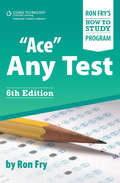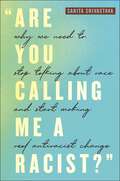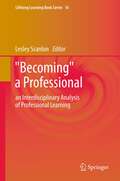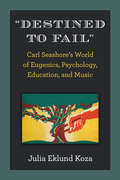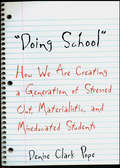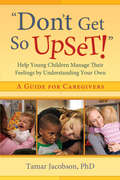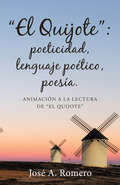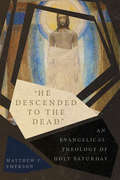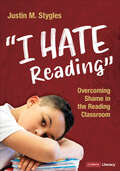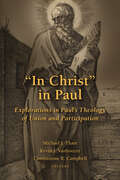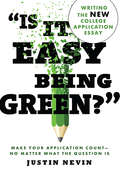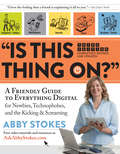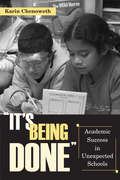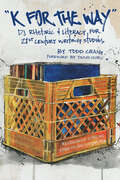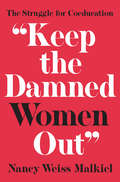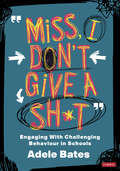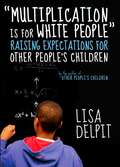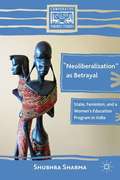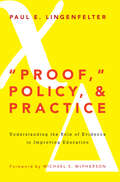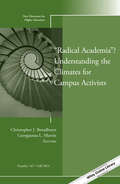- Table View
- List View
"Ace" Any Test
by Ron FryTesty on test day? Don't stress! Ace Any Test offers proven step-by-step strategies you can use in any testing situation, from classroom quizzes to standardized exams such as the SAT. Education advocate and author Ron Fry unlocks every student's successful side with preparation strategies such as reading for maximum retention, researching the teacher's testing history and preferences, and using those inevitable jitters to psych yourself up and sharpen your focus.
"Ace" Any Test (Ron Fry's How to Study Program #1)
by Ron FryA practical guide for effective test prep with strategies for improving your performance on any test—from the bestselling How to Study series. Testy on test day? Don&’t stress! &“Ace&” Any Test offers step-by-step strategies you can use in any testing situation, from classroom quizzes to standardized exams such as the SAT. Education advocate and author Ron Fry unlocks every student&’s successful side with preparation strategies such as reading for maximum retention, researching the teacher&’s testing history and preferences, and using those inevitable jitters to psych yourself up and sharpen your focus.
"Are You Calling Me a Racist?": Why We Need to Stop Talking about Race and Start Making Real Antiracist Change
by Sarita SrivastavaShows why diversity workshops fail and offers concrete solutions for a path forwardDespite decades of anti-racism workshops and diversity policies in corporations, schools, and nonprofit organizations, racial conflict has only increased in recent years. “Are You Calling Me a Racist?” reveals why these efforts have failed to effectively challenge racism and offers a new way forward.Drawing from her own experience as an educator and activist, as well as extensive interviews and analyses of contemporary events, Sarita Srivastava shows that racial encounters among well-meaning people are ironically hindered by the emotional investment they have in being seen as good people. Diversity workshops devote energy to defending, recuperating, educating, and inwardly reflecting, with limited results, and these exercises often make things worse. These “Feel-Good politics of race,” Srivastava explains, train our focus on the therapeutic and educational, rather than on concrete practices that could move us towards true racial equity. Inthis type of approach to diversity training, people are more concerned about being called a racist than they are about changing racist behavior.“Are You Calling Me a Racist?” is a much-needed challenge to the status quo of diversity training, and will serve as a valuable resource for anyone dedicated to dismantling racism in their communities, educational institutions, public or private organizations, and social movements.
"Becoming" a Professional: an Interdisciplinary Analysis of Professional Learning (Lifelong Learning Book Series #16)
by Lesley ScanlonThis book is founded on the idea that 'becoming' is the most useful defining concept for a new 'professional' class whose members understand that development in their working lives is an open-ended, lifelong process of refinement and learning. In a world where being a 'professional' is an increasingly indistinct notion and where better education and technology are challenging 'professional' norms, it is imperative that we no longer think in terms of an exclusive, 'Anglo-American', knowledge-rich class of workers. Exploring the implications of this insight for professions including nursing, teaching, social work, engineering and the clergy, this volume aims to encourage informed debate on what it means to be a 'professional' in this globalised 21st century. The book argues that 'becoming' a professional is a lifelong process in which individual professional identities are constructed through formal education, workplace interactions and popular culture. The book advocates the 'ongoingness' of developing a professional self throughout one's professional life. What emerges is a concept of becoming a professional different from the isolated, rugged, individualistic approach to traditional professional practice as represented in popular culture. It is a book for the reflective professional.
"C" Is for Cupcake
by Carolyn HaywoodThe first grade taught by Mrs. Wilkins in this book is an exciting place. Mrs. Wilkins is a teacher who is game for any activity that her pupils suggest, and Carolyn Haywood is just the writer to make sure that she never remains unchallenged for long. Most of the escapades concern Christie's pet rabbit named Cupcake, but further complications abound. Christie first takes Cupcake to school when the rest of the class is bringing baked goods to sell on Cupcake Day. Despite the confusion, the white rabbit quickly becomes the unofficial mascot of the room. Other animals also enter Mrs. Wilkins's life. At various times she must cope with a Siamese cat on the rampage and a Belgian rabbit named Cinnamon Bun. The climax comes, however, when baby rabbits arrive during breakfast at which the first graders are entertaining their daddies. First grade today is made for the irrepressible children created by Carolyn Haywood. Warm and funny, her story of their year's doings captures the spirit of the modern school.
"Destined to Fail": Carl Seashore’s World of Eugenics, Psychology, Education, and Music
by Julia KozaA little-known fact about the prominent US psychologist and educator Carl E. Seashore (1866–1949) is that he was deeply involved in the American eugenics movement. He was among the US academics to support eugenics long before German Nazis embraced it. A titan in a host of disciplines and a proponent of radical education reform, Seashore used his positional power to promote a constellation of education reforms consistent with central precepts of eugenics. Many of these reforms, including tracking, gifted and talented programs, and high-stakes standardized testing, were adopted and remain standard practice in the United States today. He promulgated the idea that musical talent is biologically inheritable, and he developed the first standardized tests of musical talent; these tests were used by early-twentieth-century researchers in their attempts to determine whether there are race differences in musical talent. Seashore’s ideas and work profoundly shaped music education’s research trajectory, as well as enduring “commonsense” beliefs about musical ability. An intersectional analysis, “Destined to Fail” focuses on the relationship between eugenics and Seashore’s views on ability, race, and gender. Koza concludes that Seashore promoted eugenics and its companion, euthenics, because he was a true believer. She also discusses the longstanding silences surrounding Seashore’s participation in eugenics. As a diagnosis and critique of the present, “Destined to Fail” identifies resemblances and connections between past and present that illustrate the continuing influence of eugenics—and the systems of reasoning that made early-twentieth-century eugenics imaginable and seem reasonable—on education discourse and practice today. It maps out discursive, citational, and funding connections between eugenicists of the early twentieth-century and contemporary White supremacists; this mapping leads to some of Donald Trump’s supporters and appointees.
"Doing School": How We Are Creating a Generation of Stressed Out, Materialistic, and Miseducated Students
by Denise Clark PopeThis book offers a highly revealing-and troubling-view of today's high school students and the ways they pursue high grades and success. Denise Pope, veteran teacher and curriculum expert, follows five motivated and successful students through a school year, closely shadowing them and engaging them in lengthy reflections on their school experiences. What emerges is a double-sided picture of school success. On the one hand, these students work hard in school, participate in extracurricular activities, serve their communities, earn awards and honors, and appear to uphold school values. But on the other hand, they feel that in order to get ahead they must compromise their values and manipulate the system by scheming, lying, and cheating. In short, they "do school"-that is, they are not really engaged with learning nor can they commit to such values as integrity and community. The words and actions of these five students-two boys and three girls from diverse ethnic and socioeconomic backgrounds-underscore the frustrations of being caught in a "grade trap" that pins future success to high grades and test scores. Their stories raise critical questions that are too important for parents, educators, and community leaders to ignore. Are schools cultivating an environment that promotes intellectual curiosity, cooperation, and integrity? Or are they fostering anxiety, deception, and hostility? Do today's schools inadvertently impede the very values they claim to embrace? Is the "success" that current assessment practices measure the kind of success we want for our children?
"Don't Get So Upset!"
by Tamar JacobsonAll childcare professionals were children once, and how their parents responded to their emotional expressions affects how they respond to emotional expressions by children in their own care."Don't Get So Upset!" examines the uncomfortable emotions providers feel--and the inappropriate ways they may respond--when children exhibit strong feelings, especially anger, fear, and grief. The book challenges teachers to reflect on their own emotional histories and to find strategies for responding to children in ways that support children's emotional health and development. It also examines how gender, culture, and societal roles can impact providers' responses to children's emotional expressions.
"El Quijote": Animación a la lectura de El Quijote
by José A. RomeroEstímulo para gozar con la lectura de El Quijote, el libro de la Literatura, el Libro de la vida, la Poesía moderna instalada en la narración. El Quijote: poeticidad, lenguaje poético, poesía pretende introducir una nueva y sugestiva orientación en los ya numerosos estudios sobre el lenguaje y estilo de El Quijote, al tiempo que persigue constituir un eficaz recurso de animación a la lectura de la magna obra cervantina. <P><P>Este trabajo demuestra con exhaustividad que el lenguaje poético es el motivo lingüístico-estilístico que constituye el esqueleto que sostiene todo el entramado de motivos temáticos y de registros lingüísticos que conforman la inmortal novela. Contiene un detenido análisis de la función poética y su aplicación al estudio y comentario de textos poéticos, que busca ofrecer una eficaz aportación al comentario de textos a partir de criterios objetivos, próximos a los empleados en la ciencia. <P><P> Tras un detenido estudio bibliográfico de los tratados, ensayos y artículos más relevantes sobre el lenguaje y estilo de El Quijote, se comprueba, sobre el texto cervantino, la absoluta presencia de construcciones lingüísticas semejantes tanto desde el punto de vista de su composición como desde la perspectiva de su significado, construcciones que constituyen la esencia de la poesía. <P>Se aborda además El Quijote como obra poética que dejó instaurada ya en el interior de la narración lo que hoy consideramos como poesía moderna. Se incluye finalmente un apéndice que tiene por objeto contribuir a facilitar la lectura a quienes encuentran cierta dificultad inicial con el lenguaje de la gran novela cervantina, con ocasión del IV centenario de la muerte de don Miguel de Cervantes Saavedra, el mayor genio de la literatura universal.
"He Descended to the Dead": An Evangelical Theology of Holy Saturday
by Matthew Y. EmersonThe Gospel Coalition"I believe he descended to the dead."
"I Hate Reading": Overcoming Shame in the Reading Classroom (Corwin Literacy)
by Justin M. StyglesIt can take a lifetime to eradicate a reader’s shame—or it can take one great teacher Shame-bound readers want someone to notice them. It’s true. But then what does a teacher do to help students? Justin Stygles found fresh answers in Gershen Kaufman’s seminal research on shame and applied it to his teaching. The results proved to him—and now us—that building relationships and taking deliberate actions to alleviate shame is crucial. With this remarkable book, Stygles shows us how to build an interpersonal bridge with students and make vulnerability okay. But make no mistake—disengaged readers need to feel competent before they fully buy in, and so the author packs the book with powerful instructional ideas. Learn to: Spot all the distress signals, including withdrawal, perfectionism, and compliance. Help students see that they are not permanently locked out of a reading life Use assessment instruments to note and celebrate incremental change Plan mini-units that develop skills in concert with engagement Design small group experiences that are free of levels and other shame-inducing labels Pump up independent reading with scaffolding and sociability Harness writing about reading to convince students of their uniqueness. The shame factor is real. It’s time we meet it head on, with innovation and the best thinking from multiple research fields. I Hate Reading is the tool that does just that.
"I Hate Reading": Overcoming Shame in the Reading Classroom (Corwin Literacy)
by Justin M. StyglesIt can take a lifetime to eradicate a reader’s shame—or it can take one great teacher Shame-bound readers want someone to notice them. It’s true. But then what does a teacher do to help students? Justin Stygles found fresh answers in Gershen Kaufman’s seminal research on shame and applied it to his teaching. The results proved to him—and now us—that building relationships and taking deliberate actions to alleviate shame is crucial. With this remarkable book, Stygles shows us how to build an interpersonal bridge with students and make vulnerability okay. But make no mistake—disengaged readers need to feel competent before they fully buy in, and so the author packs the book with powerful instructional ideas. Learn to: Spot all the distress signals, including withdrawal, perfectionism, and compliance. Help students see that they are not permanently locked out of a reading life Use assessment instruments to note and celebrate incremental change Plan mini-units that develop skills in concert with engagement Design small group experiences that are free of levels and other shame-inducing labels Pump up independent reading with scaffolding and sociability Harness writing about reading to convince students of their uniqueness. The shame factor is real. It’s time we meet it head on, with innovation and the best thinking from multiple research fields. I Hate Reading is the tool that does just that.
"In Christ" in Paul: Explorations in Paul's Theology of Union and Participation
by Kevin J. Vanhoozer Constantine R. Campbell Michael J. ThateNineteen biblical scholars and theologians in this volume explore the notions of union and participation within Pauline theology, teasing out the complex web of meaning conveyed through Paul's theological vision of being "in Christ." With essays that investigate Pauline theology and exegesis, ex-amine highlights from reception history, and offer deep theological reflection, this exemplary multidisciplinary collection charts new ground in the scholarly understanding of Paul's thought and its theological implications.
"Is It Easy Being Green?"
by Justin NevinMore and more universities and colleges are looking beyond grade point averages and standardized test scores to choose their incoming freshman. What criteria do these institutions of higher education use as their litmus test--the college application essay. But will your average high school essay do the job? When competing against thousands of qualified candidates a college applicant needs more than an introduction, three paragraphs, and a conclusion in their writer's tool belt: they need the skills to stand out from the crowd. "Is It Easy Being Green?": Writing the NEW College Application Essay offers every applicant the skills needed to write a powerful and successful application essay. Using real-life examples and testimonials "Is It Easy Being Green?" moves away from a strictly academic point of view, and uses creative writing techniques-memoir/personal essay genre in particular-to teach students how to write engaging and effective application essays. Centering on a narrative and lyrical balance, "Is It Easy Being Green?" is written in an approachable and easy-to-understand style.
"Is This Thing On?": A Friendly Guide to Everything Digital for Newbies, Technophobes, and the Kicking & Screaming
by Abby StokesLike a personal trainer for the digital age, Abby Stokes is the hand-holding, motivating expert that newbies—specifically older newbies—turn to when they want to become digitally literate. And her book, Is This Thing On?, is as smart, comprehensive, reassuring, and jargon-free as she is: the epitome of user-friendly. <P><P>And it is now completely revised and updated to keep pace with the fast-changing digital landscape, covering tablets, apps, video streaming, social media, and much more. <P>With the skill and assurance of a teacher who for over 20 years has personally taught computer skills to thousands of seniors and technophobes, Stokes covers it all: How to choose, buy, and start using the computer or tablet that’s just right for you, plus how to set everything up for maximum comfort and safety. How to connect to the Internet, sign up for email, understand and use search engines, and get started with essential skills like word processing and text messaging. How to choose, buy, and start using a smartphone. How to take and share digital photographs and videos. How to discover online communities and participate in social media like Facebook, Instagram, Pinterest, Twitter, YouTube, and blogs. How to explore the world of apps, online music, streaming movies, and ebooks. And, importantly, online security— including what to do when things go wrong. Appendices include both Apple and PC keyboard shortcuts and 200 recommended websites and 100 apps; there are FAQs at the end of each chapter and tips and tricks throughout. <P> An all-new companion website—AskAbbyStokes.com—will include video tutorials explaining the latest technologies.
"It's Being Done": Academic Success in Unexpected Schools
by Karen Chenoweth Kati HaycockThis straightforward and inspiring book takes readers into schools where educators believe--and prove--that all children, even those considered "hard-to-teach," can learn to high standards. Their teachers and principals refuse to write them off and instead show how thoughtful instruction, high expectations, stubborn commitment, and careful consideration of each child's needs can result in remarkable improvements in student achievement.
"It's Being Done": Academic Success in Unexpected Schools
by Karen Chenoweth2007 Notable Education Book, American School Board Journal This straightforward and inspiring book takes readers into schools where educators believe—and prove—that all children, even those considered &“hard-to-teach,&” can learn to high standards. Their teachers and principals refuse to write them off and instead show how thoughtful instruction, high expectations, stubborn commitment, and careful consideration of each child&’s needs can result in remarkable improvements in student achievement.
"K for the Way": DJ Rhetoric and Literacy for 21st Century Writing Studies
by Todd Craig“K for the Way” explores writing, rhetoric, and literacy from the perspective of the Hip Hop DJ. Todd Craig, a DJ himself, establishes and investigates the function of DJ rhetoric and literacy, illuminating the DJ as a fruitful example for (re)envisioning approaches to writing, research, and analysis in contemporary educational settings. Because it is widely recognized that the DJ was the catalyst for the creation of Hip Hop culture, this book begins a new conversation in which Hip Hop DJs introduce ideas about poetics and language formation through the modes, practices, and techniques they engage in on a daily basis. Using material from a larger qualitative research study that illustrates the Hip Hop DJ as a twenty-first-century new media reader, writer, and literary critic, Craig blends interviews from prominent and influential DJs in the Hip Hop community with narrative and interdisciplinary scholarship from writing studies, Hip Hop studies, African American studies, urban education, and ethnomusicology. The voices of DJs sit front and center, presenting a revolutionary conversation about writing and communication in the twenty-first century. Weaving Craig’s life experiences with important discussions of racial literacies, “K for the Way” is a layered and utterly singular exploration of culture, identity, and literacy in America.
"Keep the Damned Women Out": The Struggle for Coeducation (The William G. Bowen Memorial Series in Higher Education)
by Nancy Weiss MalkielAs the tumultuous decade of the 1960s ended, a number of very traditional, very conservative, highly prestigious colleges and universities in the United States and the United Kingdom decided to go coed, seemingly all at once, in a remarkably brief span of time. Coeducation met with fierce resistance. As one alumnus put it in a letter to his alma mater, "Keep the damned women out." Focusing on the complexities of institutional decision making, this book tells the story of this momentous era in higher education--revealing how coeducation was achieved not by organized efforts of women activists, but through strategic decisions made by powerful men.In America, Ivy League schools like Harvard, Yale, Princeton, and Dartmouth began to admit women; in Britain, several of the men's colleges at Cambridge and Oxford did the same. What prompted such fundamental change? How was coeducation accomplished in the face of such strong opposition? How well was it implemented? Nancy Weiss Malkiel explains that elite institutions embarked on coeducation not as a moral imperative but as a self-interested means of maintaining a first-rate applicant pool. She explores the challenges of planning for the academic and non-academic lives of newly admitted women, and shows how, with the exception of Mary Ingraham Bunting at Radcliffe, every decision maker leading the charge for coeducation was male.Drawing on unprecedented archival research, "Keep the Damned Women Out" is a breathtaking work of scholarship that is certain to be the definitive book on the subject.
"Miss, I don’t give a sh*t": Engaging with challenging behaviour in schools (Corwin Ltd)
by Adele BatesDo you want to be an inspiring teacher for everyone you teach, even the trickier cherubs in your class? Or maybe you just want to get through a lesson without a desk flying at you or a blazer being set alight? In this down-to-earth book Adele Bates shares practical approaches, strategies and tips from the classroom on how to help pupils with behavioural needs thrive with their education. Packed full of real-life classroom scenarios, student voice and relevant theory, every chapter offers an Action Box helping you to implement these strategies – next lesson, next week and long term. From relationship building and teaching self-regulation, to fostering inclusivity, paying attention to your own self-care and schoolwide approaches, Adele Bates unpicks some of the most difficult aspects of being a teacher and empowers you to grow as a confident classroom professional.
"Miss, I don’t give a sh*t": Engaging with challenging behaviour in schools (Corwin Ltd)
by Adele BatesDo you want to be an inspiring teacher for everyone you teach, even the trickier cherubs in your class? Or maybe you just want to get through a lesson without a desk flying at you or a blazer being set alight? In this down-to-earth book Adele Bates shares practical approaches, strategies and tips from the classroom on how to help pupils with behavioural needs thrive with their education. Packed full of real-life classroom scenarios, student voice and relevant theory, every chapter offers an Action Box helping you to implement these strategies – next lesson, next week and long term. From relationship building and teaching self-regulation, to fostering inclusivity, paying attention to your own self-care and schoolwide approaches, Adele Bates unpicks some of the most difficult aspects of being a teacher and empowers you to grow as a confident classroom professional.
"Multiplication Is for White People"
by Lisa DelpitAs MacArthur award-winning educator Lisa Delpit reminds us-and as all research shows-there is no achievement gap at birth. In her long-awaited second book, Delpit presents a striking picture of the elements of contemporary public education that conspire against the prospects for poor children of color, creating a persistent gap in achievement during the school years that has eluded several decades of reform.Delpit's bestselling and paradigm-shifting first book, Other People's Children, focused on cultural slippage in the classroom between white teachers and students of color. Now, in "Multiplication is for White People", Delpit reflects on two decades of reform efforts-including No Child Left Behind, standardized testing, the creation of alternative teacher certification paths, and the charter school movement-that have still left a generation of poor children of color feeling that higher educational achievement isn't for them.In chapters covering primary, middle, and high school, as well as college, Delpit concludes that it's not that difficult to explain the persistence of the achievement gap. In her wonderful trademark style, punctuated with telling classroom anecdotes and informed by time spent at dozens of schools across the country, Delpit outlines an inspiring and uplifting blueprint for raising expectations for other people's children, based on the simple premise that multiplication-and every aspect of advanced education-is for everyone.
"Neoliberalization" as Betrayal: State, Feminism, and a Women’s Education Program in India (Comparative Feminist Studies)
by Shubhra SharmaThis book is concerned with the three-way relationship between neoliberalism, women's education, and the spatialization of the state, and analyses this through an ethnography lens of women's education programs in India.
"Proof," Policy, and Practice: Understanding the Role of Evidence in Improving Education
by Paul E. LingenfelterHow can we “fix” our schools? Improve graduation rates in college? What works?These are questions that make the headlines and vex policy makers, practitioners, and educational researchers. While they strive to improve society, there are frequently gulfs of mutual incomprehension among them.Academics, longing for more influence, may wrongly fault irrationality, ideology, or ignorance for the failure of research to inform policy and practice more powerfully. Policy makers and practitioners may doubt that academics can deliver ideas that will reliably yield desirable results. This book bridges the divide. It argues that unrealistic expectations lead to both unproductive research and impossible standards for “evidence-based” policy and practice, and it offers promising ways for evidence to contribute to improvement. It analyzes the utility and limitations of the different research methods that have been applied to policy and practice, as well as the strengths and weaknesses of educational reform strategies. It explains why using evidence for “accountability” often makes things worse rather than better.Paul Lingenfelter offers educational researchers and policy makers a framework for considering such questions as: What problems are important and accessible? What methods will be fruitful? Which help policy makers and practitioners make choices and learn how to improve? What information is relevant? What knowledge is valid and useful? How can policy makers and practitioners establish a more productive division of labor based on their respective capabilities and limitations? He cautions against the illusion that straight-forward scientific approaches and data can be successfully applied to society’s most complex problems. While explaining why no single policy or intervention can solve complex problems, he concludes that determination, measurement, analysis, and adaptation based on evidence in specific situations can lead to significant improvement. This positive, even-handed introduction to the use of research for problem-solving concludes by suggesting emerging practices and approaches that can help scholars, practitioners, and policy leaders become more successful in reaching their fundamental goals.
"Radical Academia"? Understanding the Climates for Campus Activists: New Directions for Higher Education, Number 167 (J-B HE Single Issue Higher Education)
by Georgianna L. Martin Christopher J. BroadhurstTake an in-depth look at campus activism in the 21st century with this issue of New Directions for Higher Education. Campuses have always experienced an ebb and flow of activism, and the recent displays of student activism on American campuses show that protesters remain a vibrant subculture in American higher education. From rising tuition costs to the need to improve and welcome diversity, activists signal a continued restlessness among the nation’s collegiate youth over various issues, expressing their views with a vigor comparable to most periods in American history. The purpose of this work is to dispel the myths that today's activists are either apathetic or “radicals” determined on disrupting the “establishment.” It's also a guide to help higher education practitioners better understand the needs, rights, and responsibilities of campus activists. And, it will help readers understand the best paths to not only allowing student voice, but helping direct that voice toward peaceful and constructive expression. This is the 167th volume of the Jossey-Bass quarterly report series New Directions for Higher Education. Addressed to presidents, vice presidents, deans, and other higher education decision makers on all kinds of campuses, it provides timely information and authoritative advice about major issues and administrative problems confronting every institution.
